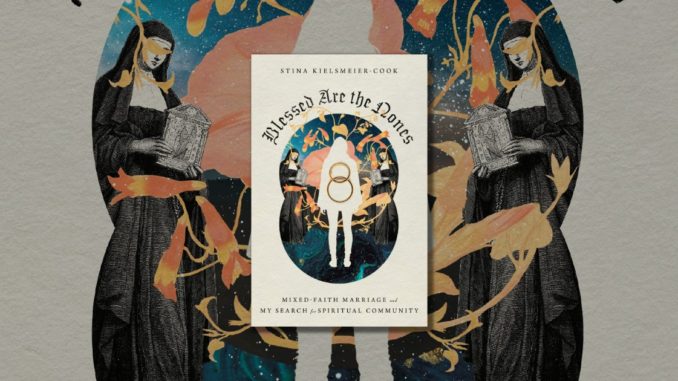
Published by IVP Books on September 8, 2020
Genres: Non-Fiction, Memoir
Buy on Amazon
Goodreads

Can the Christian life be lived alone? When her husband left Christianity several years into their marriage, Stina Kielsmeier-Cook was left "spiritually single"--struggling to live the Christian life on her own, taking her kids to church by herself, and wrestling with her own questions and doubts. In this memoir, Kielsmeier-Cook tells the story of her mixed-faith marriage and how she found community in an unexpected place: an order of Catholic nuns in her neighborhood. As she spent time with them and learned about female Catholic saints, she began to see that she was not "spiritually single" after all--and that no one really is.
At the end of Blessed are the Nones, I was left trying to determine if my feelings of unmet expectations were legitimate. It’s always difficult to criticize someone else’s story. It’s not like fiction. You can’t say you wished the author had gone a different direction because there wasn’t another direction to go. A person’s story is, obviously, personal and as long as the narrative is reflective, well-told, and engaging, a reviewer has little space to question the overarching narrative.
About fifty pages into Blessed are the Nones, my wife asked what I was reading and if I enjoyed it. I said then that if the book didn’t change, I found it interesting and compelling—but not at all what I expected. At the time, I expected the book to shift thematically toward what I did expect, but it was a shift that never really came. So at the end, I was left wondering: Did I misunderstand what to expect (and did it matter if I enjoyed the result?) or did the book leave one of its stated goals unmet?
After reflection, I think it’s a bit of both. Blessed are the Nones was billed to me as memoir about a woman—Stina Kielsmeier-Cook—coming to terms with her mixed-faith marriage. Her husband, Josh, had once been a strong Christian but since lapsed into agnosticism. Stina’s struggle is not only with her husband’s faith but the need to find a spiritual community. Despite the book’s subtitle, Mixed-Faith Marriage and My Search for Spiritual Community, Kielsmeier-Cook focuses nearly-exclusively on the latter.
This isn’t necessarily a bad thing. Her story of a Wheaton-grad evangelical finding spiritual community amid an order of Catholic nuns is an interesting story of spiritual movement that highlights the commonalities and differences of two very different strain of the same faith. It accurately highlights the positive elements of the communal and liturgical that are often missed in hyper-individualized evangelical culture.
But the mixed-faith marriage aspect really only comes out as an aside or as a framing device. Josh seems like an unwilling participant in the story. I do wonder how much of his story is not including specifically because he preferred to not talk about his journey away from faith. It’s certainly his right, and if so, Kielsmeier-Cook does well in respecting that, but to talk about a mixed-faith marriage when there is so clearly only one viewpoint presented leaves a gaping hole in the story.
When I think about what I wanted this memoir to discuss, it makes me feel almost voyeuristic. I want to know Josh’s motivations for leaving the faith. There’s some allusion that it was due to child loss—a loss with which I can empathize. I want to know if he feels that he simply can’t intellectually assent to Christianity any more, or if it is more emotional. I wanted a deeper look into their marriage and their parenting to see how they reconciled this major difference in their marriage. And I wanted more theological reflection on living in a mixed-faith marriage. Basically, my hope was a focus on the marriage aspect, but what I got was the community aspect.
Some parts of the communal aspect touch on aspects of “spiritual singleness,” as Kielsmeier-Cook explores the faith of these Catholic nuns, many of whom are single. There is one nun who is married, as she married before taking vows, and her husband is also agnostic. I expected this conversation to be of great importance in the book, but the nun basically shrugs it off as “he’s got his life; I’ve got mine” and I find that a difficult thing to comprehend.
So in the end, Blessed are the Nones didn’t answer the questions that I had, and so in that aspect was quite unsatisfactory. Yet, it never made the explicit claim that it would. I do think that it shouldn’t have given the mixed-faith aspect quite so high a billing—even using the areligious term “nones” in the title—yet it’s also hard to argue that aspect wasn’t integral to the type of community Kielsmeier-Cook found. I have to give it high marks for the story it told, even though I’m not convinced that it told the entire story it claimed.
